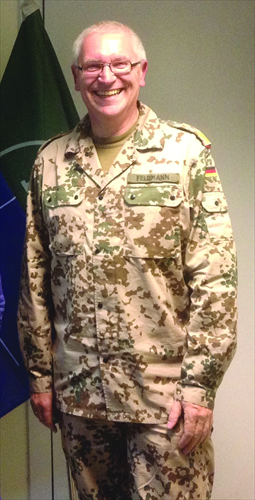Post-2014 Afghanistan ready for transition
Editor's Note:
The international community views 2014 as a landmark year for Afghanistan, as the international forces' mandate expires at the end of this year. But Washington hasn't been able to push Afghan President Hamid Karzai to sign a Bilateral Security Agreement (BSA), which is seen as key to a secure future for the country. When will the deadlock between the US and Afghanistan be resolved? How is the security situation in Afghanistan right now and what are the roles of the International Security Assistance Force? Global Times (GT) reporter Wang Wenwen talked to Brigadier General Heinz Josef Feldmann (Feldmann), the spokesman for the International Security Assistance Force (ISAF) in Afghanistan, on these issues.

Heinz Josef Feldmann
GT: How would you describe the security situation in Afghanistan right now? And how is the withdrawal process of NATO going?
Feldmann: In June 2013, the ISAF handed over the responsibility to provide security for our Afghan partners. Since then, they are in charge of providing security across the country. The Afghan National Security Forces (ANSF) is now doing the planning, the coordination, the synchronization, and the execution of combat operations on a daily basis.
As we speak, almost 30 operations are going on in Afghanistan, and their purpose right now is to enhance security for the upcoming election.
The Taliban and other insurgent groups have announced they want to disrupt and discredit the upcoming presidential and provincial elections. We have seen election-related violence against candidates and campaigners.
The focus of the ANSF is on protecting the election process. ISAF plays a secondary role.
It is up to the Afghans to provide security and we help the Afghans to provide security. So they can request our assistance. That's the process right now.
GT: Afghan President Karzai has refused to sign the BSA with the US. Why is the BSA vital for the ISAF mission?
Feldmann: We are waiting to get a signature on the BSA. The BSA is important for us, because we do not want to leave Afghanistan after the end of the ISAF mission. In order to stay, we need a legal framework. That's why it is so important that we have a chance to make our gains sustainable in the future.
We are not withdrawing from Afghanistan. We are transferring our current mission from the ISAF to what we call "Resolute Support."
This mission is significantly different from what we are doing right now, because it is a non-combat mission and we will focus on training, advising and assisting, no longer with individual soldiers but instead at the ministerial level, the higher level in the military and police, to further professionalize the security forces.
I do not want to speculate. What we hear so far is that we will get a signature. The question right now is when.
Many Afghan authorities have urged Karzai to sign, and we are confident that we will get it in time.
It is on the political level right now whether Karzai or his successor will sign it.
We, as ISAF, are staying focused on providing support for our Afghan partners in the remaining nine months to go.
GT: Despite 10 years of war, the insurgents seem undiminished, well-funded, and far from ready to surrender. How do you see that?
Feldmann: I came to Afghanistan for the first time in 2003. Comparing the situation a decade ago and now, I have to consider that Afghanistan has moved on.
There are still challenges out there, the insurgency is still resilient, but they were not able to achieve their strategic goals last year and we expect they are not this year either.
Last year for example, they wanted to enhance their freedom of movement, and they wanted to take territory in order to have better chance to influence the population. Nothing has happened.
On the contrary, from the polls we do once in a while, we know that the support of the militants is decreasing, and is below 15 percent of the population. That is a significant setback.
There is a special program from the Afghan government called "Afghan Peace and Reintegration." We have almost 8,000 former fighters who are now part of this program.
They are now back in society as credible members and are now focusing on rebuilding Afghanistan instead of destroying it.
GT: According to media reports, the Afghan public remains divided over the NATO presence in their country. What is your sense about public sentiment toward the mission?
Feldmann: The president of Afghanistan called in a Loya Jirga last year in order to debate the BSA. The Loya Jirga is the "council of elders."
But the reality is that many young Afghans were also busy debating in this process, and it is a huge gathering of influential people from all over the country. The Loya Jirga decided to support the BSA as a whole.
The majority of people in Afghanistan know that as long as the international community stays committed to this country, it will help the country to be sustainable in the future.
We also have different surveys, for example from the Asia Foundation, which say that people do understand the role of the international community in this country, where we are still providing support for and assisting Afghan authorities to make progress smarter and more immediate.
This is our commitment toward the people of Afghanistan.
GT: Without ISAF support, can the Afghan army sustain itself after this year?
Feldmann: As said before, we still have nine months left to finalize the ISAF mission and prepare for "Resolute Support."
What we have seen in the past are strong indicators for a well prepared, competent, and confident ANSF, and we have seen good development at all levels so far.
If we are invited by the Afghan government we will stay committed and we will be able to further enhance the capability and capacity of the ANSF.